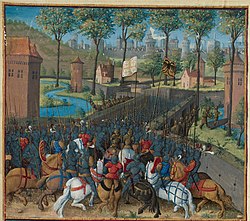
Back حصار دمشق 1148 Arabic Аблога Дамаска (1148) Byelorussian Setge de Damasc (1148) Catalan Belagerung von Damaskus (1148) German Sitio de Damasco (1148) Spanish محاصره دمشق (۱۱۴۸) Persian Damaskoksen piiritys (1148) Finnish Siège de Damas French Pengepungan Damaskus (1148) ID Assedio di Damasco Italian
| Siege of Damascus | |||||||
|---|---|---|---|---|---|---|---|
| Part of the Second Crusade | |||||||
 Siege of Damascus, miniature by Jean Colombe from Sébastien Mamerot's book "Passages d'outremer" (1474) | |||||||
| |||||||
| Belligerents | |||||||
|
Muslim forces: Supported by: | |||||||
| Commanders and leaders | |||||||
|
|
Mu'in ad-Din Unur Supported by: Saif ad-Din Ghazi INur ad-Din Zangi | ||||||
| Strength | |||||||
| 50,000 troops[1] | Unknown | ||||||
| Casualties and losses | |||||||
| Heavy | Unknown | ||||||
The siege of Damascus took place between 24 and 28 July 1148, during the Second Crusade. It ended in a crusader defeat and led to the disintegration of the crusade. The two main Christian forces that marched to the Holy Land in response to Pope Eugene III and Bernard of Clairvaux's call for the Second Crusade were led by Kings Louis VII of France and Conrad III of Germany. Both faced disastrous marches across Anatolia in the months that followed, with most of their armies being destroyed. The original focus of the crusade was Edessa (Urfa), but in Jerusalem, the preferred target of King Baldwin III and the Knights Templar was Damascus. At the Council of Acre, magnates from France, Germany, and the Kingdom of Jerusalem decided to divert the crusade to Damascus.
The crusaders decided to attack Damascus from the west, where orchards of Ghouta would provide them with a constant food supply. Having arrived outside the walls of the city, they immediately put it to siege, using wood from the orchards. On 27 July, the crusaders decided to move to the plain on the eastern side of the city, which was less heavily fortified but had much less food and water. Afterwards, the local crusader lords refused to carry on with the siege, and the three kings had no choice but to abandon the city. The entire crusader army retreated back to Jerusalem by 28 July.
- ^ Runciman 1952, pp. 228–229.
© MMXXIII Rich X Search. We shall prevail. All rights reserved. Rich X Search